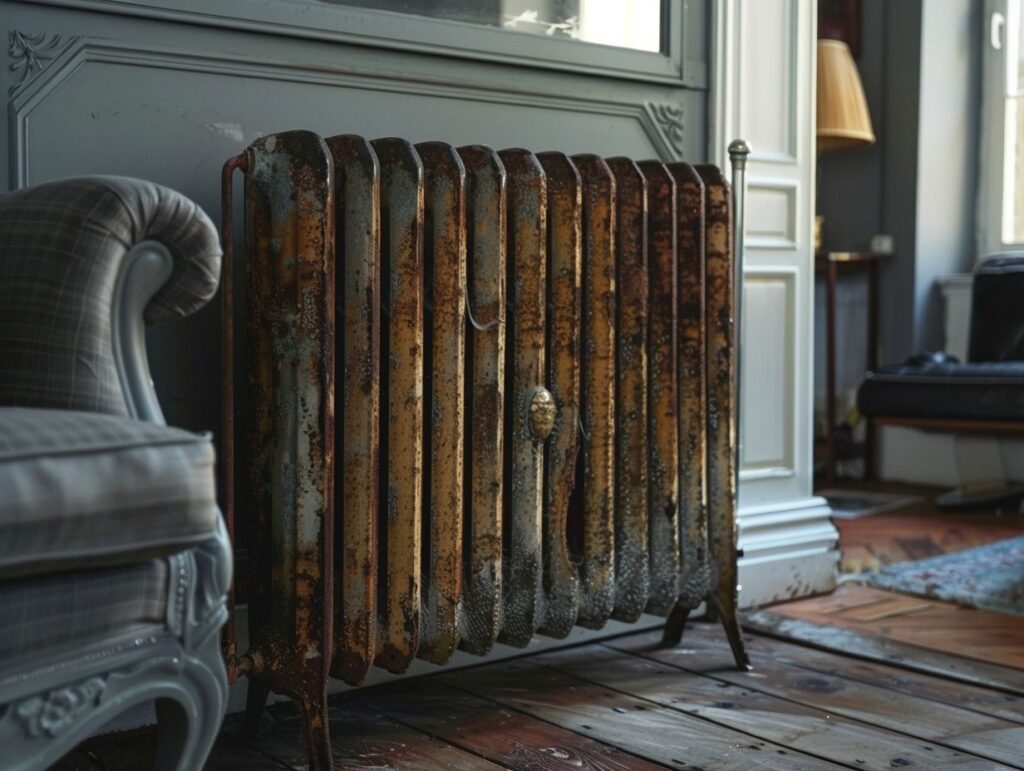Rust on radiators is a common issue that many homeowners encounter, affecting both the functionality and appearance of these crucial heating components. Understanding the reasons behind radiator rust and its implications on heating efficiency is essential.
Consider proactive approaches such as routine maintenance and the application of protective coatings. Additionally, familiarise yourself with potential solutions for addressing rusty radiators, whether through repair or replacement. By educating yourself on maintaining radiators, you can ensure optimal performance and a comfortable, warm environment in your home.
Key Takeaways:
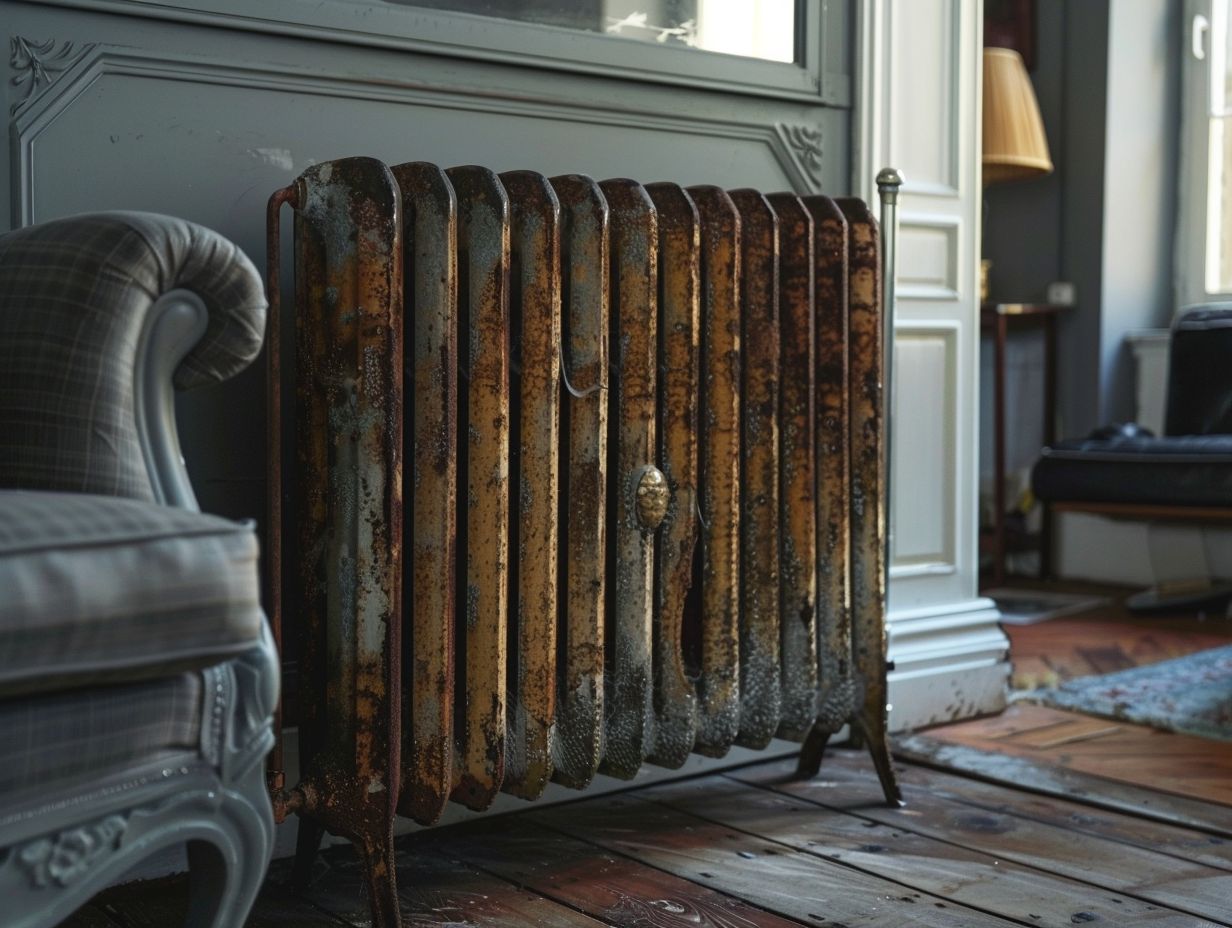
- Rust on radiators is caused by a combination of moisture, oxygen, and metal, leading to corrosion and potential damage to the radiator’s performance.
- Rusty radiators can decrease heating efficiency, resulting in higher energy bills and potential malfunctions.
- Prevent rust on radiators through regular maintenance and cleaning, as well as using protective coatings and treatments. If rust does occur, consider DIY methods or professional solutions before considering replacement.
Understanding Radiator Rust
Understanding Radiator Rust is crucial for maintaining the efficiency and durability of your heating system. Rust, also referred to as corrosion, can impact radiators due to various factors, including prolonged exposure to water, the presence of sludge, and the material composition, especially in steel.
This corrosion process can result in a range of issues within your heating system, affecting its overall performance and potentially leading to leaks or malfunctions. It is essential to conduct regular maintenance to prevent and address rust in radiators.
Clearing out any accumulated sludge and ensuring adequate ventilation can help reduce the risk of corrosion. Incorporating inhibitors in the water, such as anti-corrosion solutions, can establish a protective barrier to minimise the chances of rust formation.
By proactively taking these measures and remaining alert for indications of rust, you can prolong the lifespan of your radiators and uphold efficient heating in your residence.
What Causes Rust on Radiators?
The formation of rust on radiators can be attributed to various factors, including the presence of sludge in the water system, chemical reactions between water and metallic components, and processes of galvanic corrosion. The build-up of sludge in the radiator can foster rust formation by trapping moisture and serving as a catalyst for corrosion.
When water interacts with the radiator’s metal, particularly in the presence of oxygen, it triggers a sequence of oxidation-reduction reactions that result in rust. Galvanic corrosion occurs when different metals are in contact, hastening the deterioration process.
To mitigate this, corrosion inhibitors can be employed to establish a protective layer on the metal surface, preventing direct contact with water and impeding rust formation.
Routine maintenance, such as system flushing and the utilization of high-quality coolant containing corrosion inhibitors, plays a crucial role in preventing rust and prolonging the lifespan of radiators.
Impact of Rust on Radiator Performance
The impact of rust on radiator performance extends beyond aesthetics, affecting your central heating system’s overall efficiency and functionality. Corrosion can lead to issues such as reduced heat output, system blockages, and the degradation of radiator components.
If left unchecked, rust buildup within your radiators can impede the circulation of hot water, resulting in uneven heating distribution throughout your property.
Galvanic corrosion, which occurs when dissimilar metals come into contact, can accelerate the deterioration process, posing significant risks to the structural integrity of your heating system.
Timely interventions, such as regular maintenance checks and the installation of corrosion-resistant materials, are crucial in preventing costly repairs and ensuring the longevity of your central heating system.
Effects on Heating Efficiency
The presence of rust in radiators can have detrimental effects on heating efficiency. Issues such as pitting, the accumulation of chlorides, and the formation of noble scale can all contribute to reduced system performance.
These corrosion processes occur as a result of the interaction of oxygen and water with the metal surface, initiating a series of electrochemical reactions that lead to the degradation of the radiator material. This results in the formation of iron oxides, ultimately weakening the structural integrity of the heating system.
Over time, the build-up of rust particles can clog pipes and reduce the heat transfer capacity, diminishing the system’s effectiveness in maintaining optimal temperatures.
To address these challenges, implementing corrosion inhibitors, adhering to regular maintenance schedules, or even exploring alternative materials for radiator construction can help alleviate the impacts of rust on heating efficiency.
Preventing Rust on Radiators
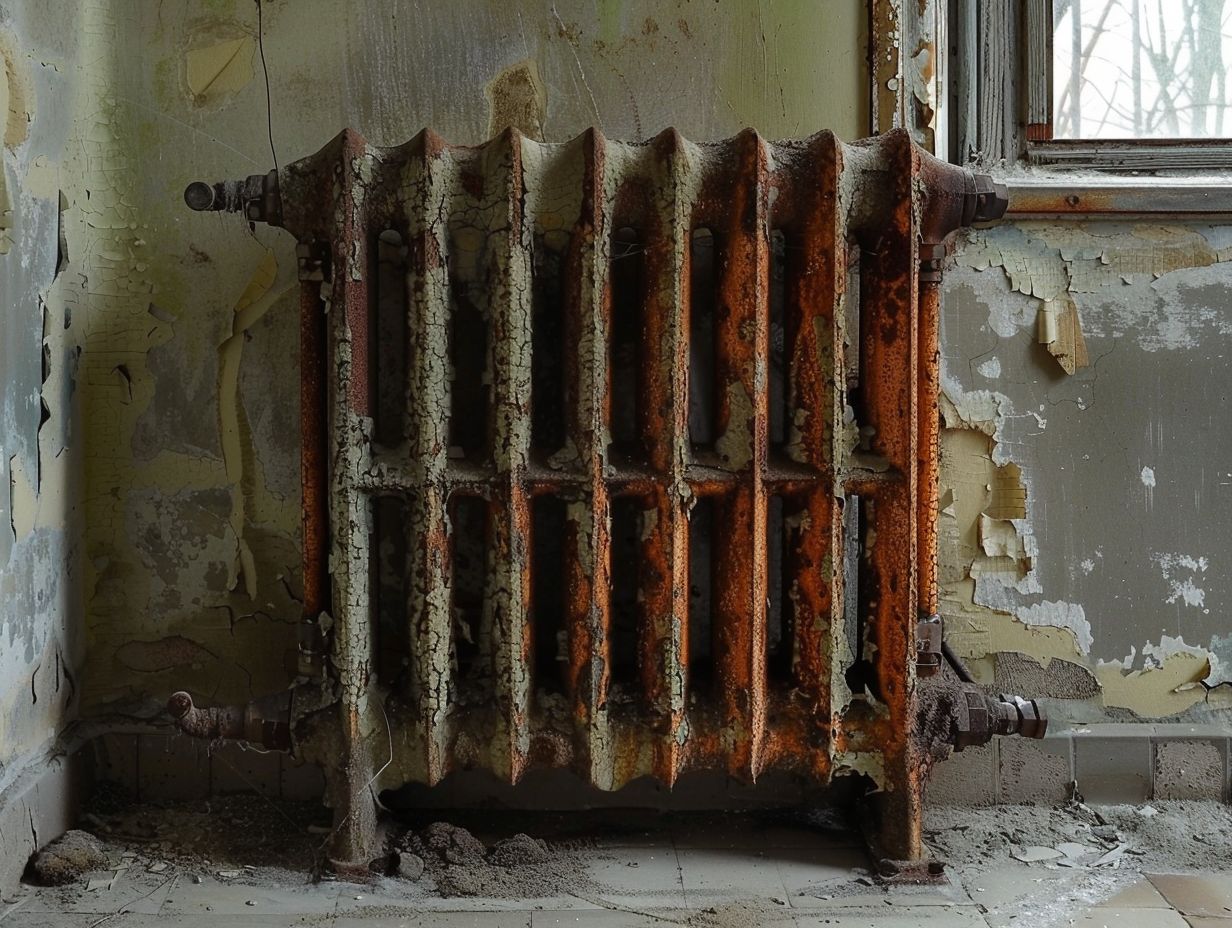
Preventing rust on radiators is essential for maintaining the longevity and efficiency of your heating system. You should implement preventative measures such as using corrosion inhibitors, selecting suitable materials, and carrying out regular maintenance to significantly reduce the risk of corrosion.
Corrosion inhibitors play a crucial role in preventing rust by creating a protective barrier on the radiator’s surface, which inhibits the reaction between metal and oxygen. When selecting materials for your radiator, it is advisable to choose corrosion-resistant options like stainless steel or aluminium to minimise the risk of rust formation.
Participating in regular maintenance practices such as flushing the system, inspecting for leaks, and ensuring proper ventilation can help prolong the lifespan of your radiators and ensure optimal performance.
Regular Maintenance and Cleaning
Regular maintenance and cleaning of your radiators play a vital role in preventing rust and corrosion within your heating system. Engaging the services of a qualified plumber for periodic inspections and power flushing can help remove sludge buildup and maintain optimal radiator performance.
By ensuring that your radiators are well-maintained, you not only extend their lifespan but also enhance the overall efficiency of your heating system. Power flushing, a professional service provided by experts, is particularly effective in eliminating debris that accumulates over time, leading to improved heat distribution and reduced energy consumption.
Regular maintenance can identify potential issues early, saving you from costly repairs in the future. You can contribute to radiator upkeep by bleeding air from the system, checking for leaks, and using inhibitor products to prevent corrosion.
Protective Coatings and Treatments
By applying protective coatings and treatments to your radiators, you can proactively guard against the development of rust, both internally and externally. These solutions establish a barrier that protects the radiator surfaces from corrosive elements, thereby extending their lifespan and preserving system efficiency.
In addition, protective coatings have the potential to enhance the heat transfer capabilities of your radiators, thereby improving overall heating performance. Internal coatings play a crucial role in preventing mineral build-up, which in turn enhances water circulation and reduces the likelihood of blockages.
External treatments offer resistance to scratches, UV exposure, and other environmental factors, ensuring that your radiator maintains its pristine appearance for an extended period.
By investing in these protective measures and adhering to proper application procedures and maintenance protocols, you can effectively prolong the life of your radiators. This proactive approach not only helps you save on replacement costs but also enhances energy efficiency in the long run.
Repairing Rust on Radiators
Address rust on your radiators promptly to prevent further damage and restore optimal system performance. You can choose between DIY methods or professional solutions to effectively repair rusted radiators and ensure the longevity of your heating systems.
DIY approaches for rust repair typically involve sanding down the affected areas, applying a rust converter, and then painting the radiator to prevent future corrosion.
Conversely, professional radiator repair services may utilise specialised tools and treatments to efficiently eliminate rust and deliver a more durable solution.
When dealing with rust on radiators, it is crucial to begin by shutting off the heating system and allowing the radiator to cool before proceeding with any repair work. By following these steps, you can effectively address rust issues and maintain the efficiency of your heating systems.
DIY Methods and Professional Solutions
Regarding repairing rust on radiators, you have the option to choose between DIY methods and professional solutions. DIY approaches may include the installation of sacrificial anodes or magnesium anodes to minimise further corrosion and prolong the heating system’s lifespan.
Sacrificial anodes are metallic devices designed to protect the radiator from corrosion by attracting corrosion to themselves, thereby sacrificing their own material integrity. On the other hand, magnesium anodes function through electrolysis processes, effectively preventing rust formation by providing an alternative area for oxidation to take place.
Professional solutions for addressing rust on radiators typically involve a thorough inspection, cleaning, and replacement of any severely affected components to ensure the optimal functionality of the system. These services are particularly beneficial for those who prefer a hands-off approach or when the rust damage is extensive.
Replacing Rusty Radiators
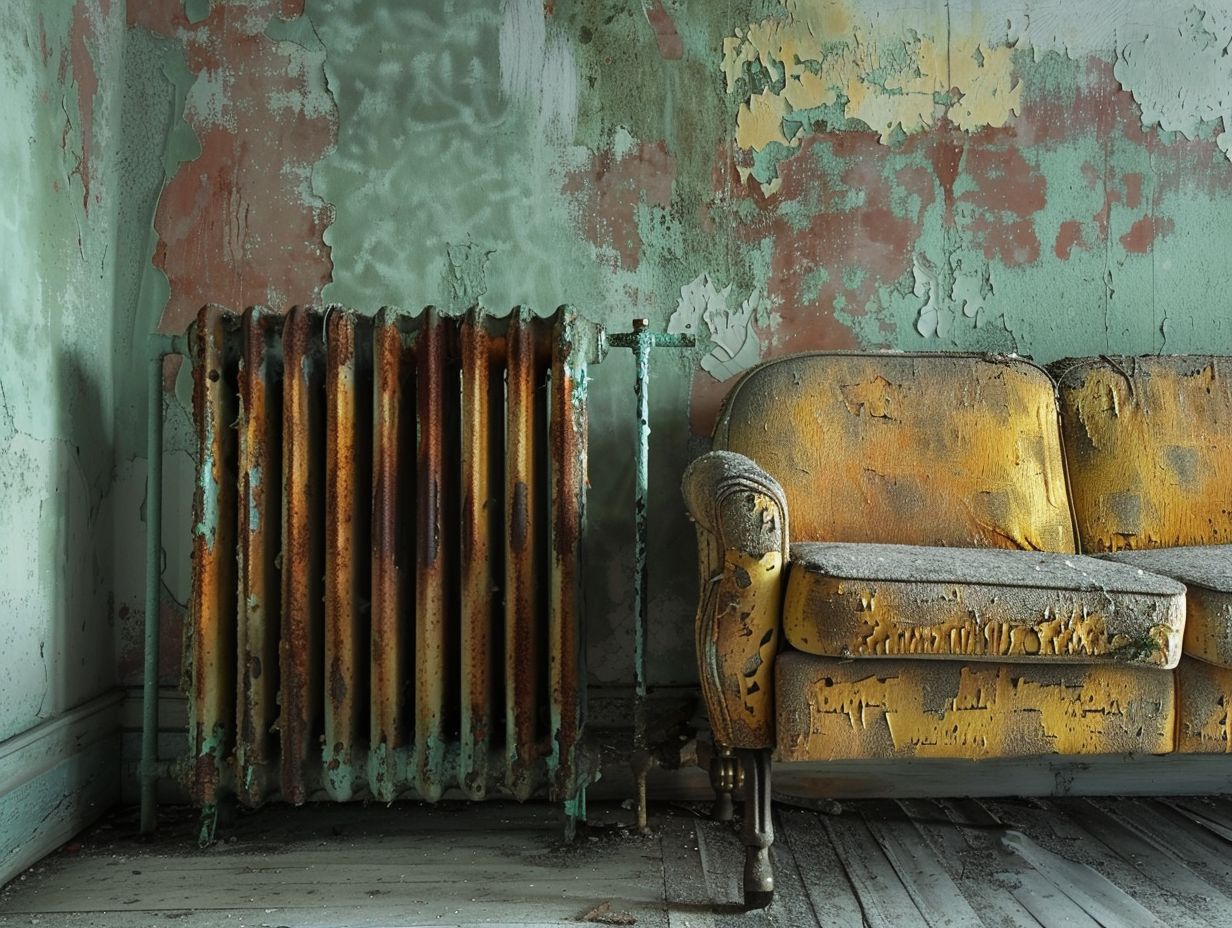
In situations where rust damage is extensive or irreparable, replacing rusty radiators may present itself as the most practical solution to restore optimal heating system performance. Homeowners like yourself are presented with a range of options when it comes to choosing new radiators, with selections varying from modern designs to energy-efficient models.
It’s crucial to consider energy efficiency, as newer radiators often feature advanced attributes that can assist homeowners in reducing energy expenses. Ensuring compatibility with the existing heating system is imperative to facilitate seamless integration.
When deciding on a replacement radiator, homeowners should also factor in their design preferences to guarantee that the new unit complements the overall aesthetic of their residence.
Whether you are considering traditional cast iron radiators or contemporary panel radiators, the selection of a radiator that harmonises functionality, efficiency, and style is fundamental for the successful upgrade of your heating system.
When to Consider Replacement
Determining when to replace rusty radiators pivots on the extent of corrosion damage and the effectiveness of preventative measures. If preventative strategies prove ineffective or if the radiators show signs of severe rusting that compromise system efficiency, you should consider replacement to prevent further issues.
It’s crucial for homeowners to stay vigilant for warning signs that indicate potential radiator troubles. Leaks, inconsistent heating, strange noises, or visible rust spots are common indicators that suggest the need for radiator assessment. By addressing these early on, you can avoid more extensive damage and costly repairs down the line.
Proactive maintenance, such as regular flushing of the system and using corrosion inhibitors in the coolant, can significantly prolong the lifespan of radiators and ensure optimal performance. Knowing when to proactively invest in new radiators is key to maintaining a comfortable and efficient heating system.
Options for New Radiators
When selecting new radiators to replace rusty ones, you should consider the material composition, design aesthetics, and preventive features to enhance the longevity and performance of your heating system.
Materials such as aluminium or stainless steel offer corrosion resistance and durability, making them ideal choices for modern radiator installations.
Plus material composition, the design aesthetics of radiators can also play a significant role in enhancing the overall look and feel of a room. Sleek and modern radiator designs can complement various interior styles, while traditional designs may suit more classic decors.
To safeguard your new radiators against rust and corrosion, you should also consider installing a corrosion-resistant coating or utilising inhibitors in your heating system to prevent the buildup of rust over time. Regular maintenance, such as bleeding the radiators and checking for leaks, is essential in ensuring optimal performance and longevity.
Frequently Asked Questions
What causes living room radiators to rust?
Living room radiators can rust due to a variety of factors such as high moisture levels, exposure to salt or corrosive chemicals, and age-related wear and tear.
Does the type of metal affect the amount of rust on a living room radiator?
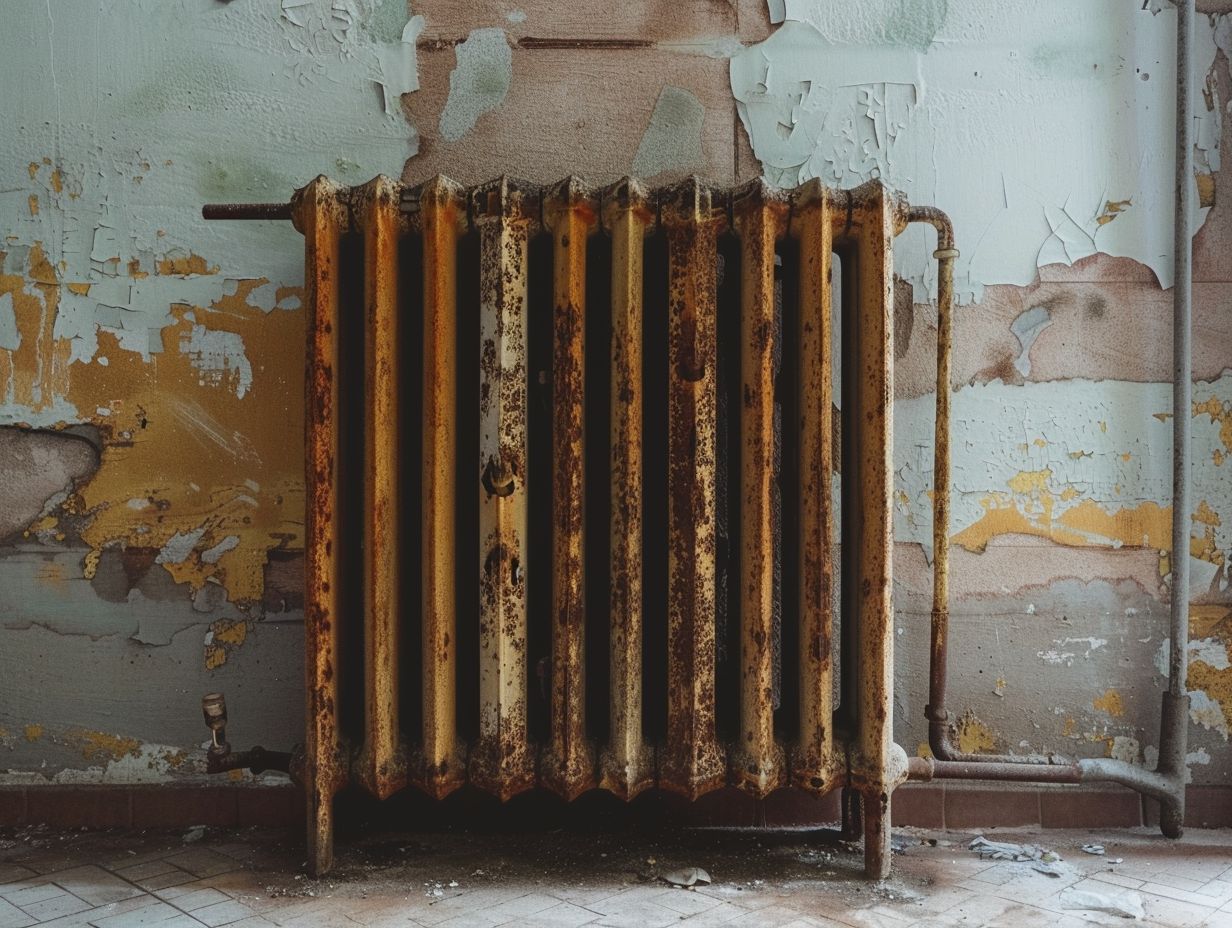
Yes, the type of metal used in the radiator can impact its susceptibility to rust. For example, steel radiators are more prone to rust compared to aluminium radiators.
Can the quality of installation affect the rusting of living room radiators?
Absolutely. Poor installation can result in water or moisture becoming trapped inside the radiator, leading to accelerated rusting and corrosion.
How can I prevent my living room radiators from rusting?
Regular maintenance and cleaning can help prevent rust on living room radiators. Additionally, keeping the room well-ventilated and controlling moisture levels can also help prevent rust formation.
Are there any warning signs of rusting that I should look out for?
Yes, some warning signs of rusting on living room radiators include discolouration, flaking or peeling paint, and visible rust spots. It’s important to address these issues promptly to prevent further damage.
Can rust on living room radiators be repaired?
In most cases, yes. Minor rust can be sanded and repainted, while more severe rust may require professional repairs or replacement of the affected parts. Regular maintenance can help prevent the need for major repairs in the future.

